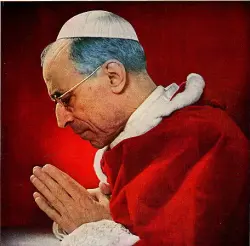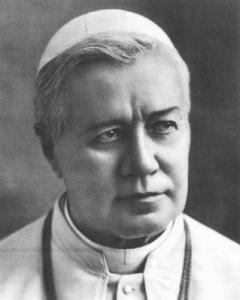Archbishop Lefebvre on “Extra Ecclesiam Nulla Salus”
I am more and more persuaded that if one wants to read contemporary sources of undoubted Catholic orthodoxy, the SSPX is the place where to look.
For this reason, whenever you think or suspect that something is not orthodox enough, or might be “nuChurch” under the appearance of orthodoxy, it is never wasted time to look what the SSPX says on the matter. These are people willing to be excommunicated to remain faithful to Truth, and there is no way they are going to compromise.
Let us take, for example, the “extra ecclesiam nulla salus” question – so often misused by misinformed – or disingenuous – Protestants to shoot at the Church and criticise her alleged lack of common sense – and let us see what Archbishop Lefebvre had to say on the matter.
From the “Open Letter to Confused Catholics”, available online in English from the SSPX Asia, we read the following:
First, the late Archbishop sets the main points of the question:
The Church is the one ark of salvation, and we must not be afraid to affirm it. You have often heard it said, “Outside the Church there is no salvation”–a dictum which offends contemporary minds. It is easy to believe that this doctrine is no longer in effect, that it has been dropped. It seems excessively severe.
Yet nothing, in fact, has changed; nothing can be changed in this area. Our Lord did not found a number of churches: He founded only One. There is only one Cross by which we can be saved, and that Cross has been given to the Catholic Church. It has not been given to others. To His Church, His mystical bride, Christ has given all graces. No grace in the world, no grace in the history of humanity is distributed except through her.
Then, he proceeds to explain how proper Catholic doctrine is rightly interpreted:
Does that mean that no Protestant, no Muslim, no Buddhist or animist will be saved? No, it would be a second error to think that. Those who cry for intolerance in interpreting St. Cyprian’s formula, “Outside the Church there is no salvation,” also reject the Creed, “I confess one baptism for the remission of sins,” and are insufficiently instructed as to what baptism is. There are three ways of receiving it: the baptism of water; the baptism of blood (that of the martyrs who confessed the faith while still catechumens) and baptism of desire.
Baptism of desire can be explicit. Many times in Africa I heard one of our catechumens say to me, “Father, baptize me straightaway because if I die before you come again, I shall go to hell.” I told him “No, if you have no mortal sin on your conscience and if you desire baptism, then you already have the grace in you.”
The doctrine of the Church also recognizes implicit baptism of desire. This consists in doing the will of God. God knows all men and He knows that amongst Protestants, Muslims, Buddhists and in the whole of humanity there are men of good will. They receive the grace of baptism without knowing it, but in an effective way. In this way they become part of the Church.
The error consists in thinking that they are saved by their religion. They are saved in their religion but not by it. There is no Buddhist church in heaven, no Protestant church. This is perhaps hard to accept, but it is the truth. I did not found the Church, but rather Our Lord the Son of God. As priests we must state theTruth.
Finally, in case you should think there is a rather easy way to salvation outside the Church, he takes all illusions away from you:
But at the cost of what difficulties do people in those countries where Christianity has not penetrated come to receive baptism by desire! Error is an obstacle to the Holy Ghost. This explains why the Church has always sent missionaries into all countries of the world, why thousands of them have suffered martyrdom. If salvation can be found in any religion, why cross the seas, why subject oneself to unhealthy climates, to a harsh life, to sickness and an early death? From the martyrdom of St. Stephen onwards (the first to give his life for Christ, and for this reason his feast is the day after Christmas), the Apostles set out to spread the Good News throughout the Mediterranean countries.
Would they have done this if one could be saved by worshipping Cybele or by the mysteries of Eleusis? Why did Our Lord say to them, “Go and preach the Gospel to all nations?”
Finally, a concrete example of how the post V II Church could be terribly wrong, and suffer the Truth to be substituted with heresy or worse by the work of the bishops themselves:
It is amazing that nowadays certain people want to let everyone find his own way to God according to the beliefs prevailing in his own “cultural milieu.” A bishop once told a priest who wanted to convert the little Muslims, “No, teach them to be good Muslims; that will be much better than making Catholics of them.”
Now please observe this:
1) This is straightforward, well explained, full of common sense and easy-to-grasp wisdom. Personally, I found that whenever you look for authentic Catholic answers, this is what you find.
2) This comes from a man of such unflinching orthodoxy as to be able to suffer excommunication just a few years before death, for the sake of Truth. You can think for yourself how probable it is this is not a fair and accurate representation of infallible Magisterium.
I have very often found that the critics of the SSPX love to criticise them based on preconceptions they have heard of – probably by some tambourine priest – and uncritically accepted. These people are seriously good, infinitely better Catholics than those priests and bishops calling them “schismatics”, or worse.
Irrespective of the final outcome of the SSPX-Vatican talks, I would encourage everyone to inform themselves about the SSPX position on whatever matter, rather than indulging in criticism by hearsay.
You will discover they take their name very, very seriously.
Mundabor
Posted on April 15, 2012, in Catholicism, FSSPX and tagged Archbishop Lefebvre, Extra ecclesiam nulla salus. Bookmark the permalink. 4 Comments.





















Archbishop Lefèbvre: Santo subito! Santo subito! 😉
I fully agree!
Santo subito! 😉
M
I’ve always found that when a heretic tries to explain their heresies, it actually causes me to have headaches, because it’s so hard to follow their perverted reasoning. But when an orthodox clergyman like Lefebvre explains either orthodoxy or heresy, it’s easy to understand. This is the main reason why I support orthodoxy; it promotes clear thinking and gets rid of headaches.
Great, Stephen! 😉